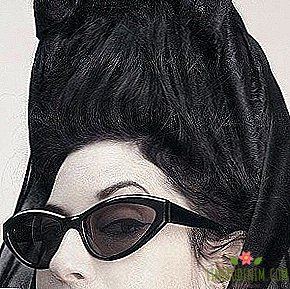Hidden homophobia: How discrimination hides in jokes, clichés and advice
Hostility and aggression against certain groups - this is not only the story of open hatred, ending with a mass execution. At work, at the doctor's office, on an advertising billboard - its corrosive traces are found everywhere. Anyone can blunder: most of the sick issues have only recently begun to be discussed publicly and there is no consensus on them yet. It is especially difficult to discuss problems that many have never dealt with. As a result, in order to identify discriminatory codes in speech, one has to make certain analytical efforts, which is not always easy or pleasant - and most often causes a counterargument to "cling to the words."
Indeed, discrimination, like the devil, is hidden in the details: hackneyed phrases, expressive stereotypes and bearded jokes. Without noticing, we are dealing with everyday discrimination every day, whether it is a scornful attitude towards women, migrants or homosexuals. Actually, homophobia is one of the most common problems, which is not everyone’s problem. We decided to examine the most frequent practices of everyday discrimination based on sexual orientation, which is long overdue.

Hang tags
Any sexuality is associated with stereotypes. They are triggered in the head at every opportunity, and within the discriminated group too. So, in the very word “homosexuality”, for sociocultural reasons, women fall into the invisibility zone. Thus, a long patriarchal division in the language into illegal “homosexuality” (meaning same-sex relations only between men) and privately approved lesbianism worked. Gay culture, gay prides, gay sex as a result, mainly correlated with male images. From the notorious "Brokeback Mountain" to the cult TV series "Queer as Folk" - men are primarily associated with the word "gay". The illusion of the male "face" of homosexuality is tenacious, although in reality homosexuality is one of the forms of sexual orientation, just like heterosexuality or bisexuality is characteristic of both men and women.
Actually, there is a whole package of stable associations with the concept of "gay", from which follows the epithet "gay" and the habit of marking them with certain things or actions. One has only to attribute special events to neutral events and things, for example, the “gay” nature, and it is already possible to look for shades of discrimination - the principle is exactly the same as with some “female” weakness or “Jewish” greed. So there is a recognizable group logo, a label that ignores the diversity and differences of people.
Neither the earring in the man’s ear nor the short haircut of a woman should become signs of homosexuality and turn into a tool for surveying people.
Say “this shirt is some kind of gay” - keep in mind a characteristic image: something vulgar, tight, perhaps with elements of leather and lycra. To consider that “Eurovision” is a competition “for gays and housewives” means to rank people and attribute strictly defined hobbies to them, evaluating one through the other, but invariably as unworthy and miserable. To call HIV a gay disease is not only to make a big mistake in assessing the risks of any of us, but also implicitly linking the disease with some supposedly “dirty” type of sex.
In any culture there is a rigidly fixed system of permissible actions and their assessments - and in the machista many actions are automatically read as “gay”, requiring immediate censure, and even punishment. Holding hands is treated as a meta gay and, accordingly, low behavior, which may entail an immediate discriminatory attack. This logic works in the other direction - so any close bodily contact of “real men” causes ironic suspicions of his latent “gayness”, whether it be wrestling or a joint campaign in the bath.
All this speaks only about one thing - a monopoly on a sign (even if once it really served as an “identification”) does not bode well, monstrously simplifying and distorting the picture of the world. Neither the earring in the man’s ear, nor the short haircut of the woman, nor the use or non-use of cosmetics should become signs of homosexuality and turn into a tool for surveying people.
Summarize people into a group and rate it.
Dehumanizing a particular person is more difficult, so it often sounds like: “I have a gay friend, but ...” According to this scheme, it is easy to build any discriminatory statement, be it a replica about Muslims or blondes. After all, it is enough to make a reservation about the "exception" in order to supposedly have the right to speak out against an impersonal group as a whole. Against gay parades or the possibility of a same-sex couple to have children, against every person who professes Islam, against lesbians and feminists. And then belonging to a minority automatically means that a person is limited in rights: to family life, to freedom of movement, freedom of thought.
A certain mass of prejudice, which covers all the representatives at once, becomes a common stigma for the group. Landlords sin in such that they rent housing only to "persons of Slavic nationality." Bias to certain groups of people, in turn, forms a further relationship to their representatives. And to resist this dehumanization is not easy at all, since we are talking about prejudices firmly fixed in a particular society. In fact, describing a person as a "lesbian" or "migrant" is like looking at one side of a ZD figure and drawing conclusions about the whole figure on this side, ignoring the human volume and versatility.
Masking intolerance with jokes
Laughter relieves stress, and healthy irony brightens the attitude to serious situations. However, humor remains the most controversial and complex component of everyday discrimination. Not all jokes are the same bad, but to understand what's what, you need to debug the moral tuning fork. You should not equate the veiled in the form of a joke rudeness to the courageous attacks of Louis Xi Kay, who never joking just for joke or someone's humiliation.
Nevertheless, not all of us are Louis C. Kay, and everyone should be more attentive to others and develop a sense of tact - because some jokes about women, homosexuals, and many others still pierce through the discriminatory bottom. Arguments in the spirit of "yes, you have no sense of humor" in this case do not work. Humor is a serious tool that can both make you think about a problem and form a very unhealthy picture of the world. It is hardly possible to draw a direct parallel between the joke about violence and the act itself, but these phenomena exist in the same field of permissibility of such things. Unfortunately, we still live in a society where it is acceptable, on the one hand, to joke about “chicks” and “stupid Uzbeks”, and on the other, to move from words to actions: cripple girls and show inhumanity to migrants.
As with any skill, you can learn to joke with dignity so that it does not work out like this. Any hateful joke, especially in a not very tolerant society, flows into the flow of other discrimination. So, an evil joke can only add fuel to the fire, but in the end we have serious statements about the need to burn gay hearts. The word is generally a powerful tool, and you should not forget that it can hurt someone, even if it seems to you that there is no “nothing” in it. Even if someone does not mind that she or she is called a “whore,” “chick,” “fagot,” or “hachik” - by and large, it is still part of the hate speech.

Highlight "special" LGBT sexuality
If you present the topic of homosexuality as a tag cloud, "sex" will be one of the most visible. In homophobic discourses it is called “dirty”, “vicious”, “meaningless”. The latter is a consequence of the conservative tradition of associating sexual practices with the function of child-production. Despite the fact that modern sex is even homo-at least heterosexual infinitely far from the task of solely the work of posterity.
The bed aspect of homosexual relationships is served as the most immoral evil and unacceptable departure from “normal” sexual relations. To mark the particular gay sex activity, to refer to the disorder and diversity of sexual relations as a perversion, to stigmatize gay practices as incorrect and unnatural - symptoms of discrimination.
Determining the normality or abnormality of sex activity that occurs by mutual consent and within the framework allowed by law is in itself a vicious practice
Homosexual hedonism is generally one of the main cliches played out in the media, films and oral speech. Many things are subject to censure: how they have sex (supposedly without protection, choosing random partners how and where they will have to) and with what effect (here the idea of promiscuity without obligations and feelings is used). The enmity language is also involved: obscene vocabulary and concentration on the sexual sphere.
Determining the normality or abnormality of sex activity that occurs by mutual consent and within the limits allowed by law is in itself a vicious practice. The quantity and quality of sex in the life of any of us is not a measure of propriety and high moral standards. The diversity and variability of sexual practices suggests that the differences are at the level of preferences of each individual, and not necessarily this difference is tied to the orientation of partners.
Take a protective stance
Help is not equal to patronage, and sincere sympathy is different from intrusive care. It is useless, and even harmful, to try to do good. The help coming from above signals that you are sure that the receiving party is defective: this person is deprived, he does not have access to the possibilities of a "normal" person. Of course, this attitude is fundamentally wrong.
Trying to arrange someone's personal life is not the most rewarding idea at all, but intrusive pandering is a direct confirmation that you consider a person unable to find a partner on his own. The phrase "I have a great friend, and he is also a lonely gay" gives a stereotype that people of homosexual orientation should grab any straw, because it is much harder for them to find their "half" than heterosexuals. And this is another face of discrimination, only positive.
An even more dangerous form of imposing sexuality is insistent offers to lesbians to try a relationship with a "real man." Draw sexuality, including female, can not be forced to "normalize." Behind such advice is a patriarchal mythical message: a man is able to literally turn a woman into heterosexuality by force. History knows many horrific examples of its practical application - the practice of corrective rape becomes a really traumatic outcome. And uninvited advice, hiding behind help, and such monstrous acts against the will of man - all this fits into a culture of violence.
Represent identity as a set of clichés
A striking example is the gay girlfriend image, widely replicated at one time, like Stanford Blatch from Sex and the City. A homosexual man who, unlike the "real", will share the true "girlish" joy. This cliché is primarily associated with terry stereotypes: girls love shopping, and boys love to drink beer in a bar. In such an uncompromising world, gay men are considered exclusively "as girls", losing the right to be just a man, complex and multifaceted.
Moving away from this hopelessly outdated canon, one can easily understand: friendship, craving for concrete activities, the desire to go shopping together is a matter of individual preferences. If you go beyond the "typically female" and "typically male" ways to have a good time, the difference between a friend and a friend does not remain - it's just a person with whom you are good. It is a mistake to try on the role of an ideal potential girlfriend for every gay friend, and to wait for the behavior of a “shirt guy” from each lesbian. Such friendships can be - and this is fine, but sexual orientation does not imply a ready-made personality pattern, as well as the duty to conform to this pattern.

Ignore human identity
Language is a serious field of struggle. Any zone of silence, lack of suitable words, a language of hatred and enmity create reality. Accurate attitude to the language is part of a complex of measures for cultivating humanity in oneself. Here is a simple exercise from pop psychology: several times in a row to answer the question "who am I?". We fight (and win) all the time for the right to call ourselves who we are. Sexual orientation, gender identity is an important part of empowerment and self-identification. It is especially important to identify the person as he sees fit. Consider a person's preferences — address him as he asks: for example, in the case of transgenderness, it is always better to clarify which genus to use.
Carefully it is worth using words whose meaning you have not fully clarified for yourself. Knowledge of basic terms will help to avoid a variety of awkwardness. It is useful to deal with prefixes (cis- and trans-, homo- and hetero-), understand the difference between cross-dressers and intersex people, do not try to systematize according to the heteronormative canon. Many are mistaken: calling a transgender woman "an ex-man", equating travesty-genre to homosexuality, defending the theory of a binary gender system, ignoring intersex.
Believe in the existence of "gay radar"
In Russian there is a saying "Fisherman sees fisherman from afar." She sometimes describes the possibility of intuitively recognizing people of homosexual orientation. Simply put, it is a built-in "radar", which signals the approach of "their". And although “geydar” pretends to be an intuitive feeling, in fact it often turns out to be a bag of clichéd ideas about gays and lesbians. It is like trying to guess the level of education by the way a person eats - the risk to hit the finger in the sky is too high. There are no unambiguous scientific data on this subject: any experiments reveal the mythological nature of the "geydar". In addition, the idea that you can "feel" someone's sexual orientation, goes against the idea of fluid, variable sexuality. Well, it is difficult to imagine the work of "geidar" in the case of bisexuality, pansexuality or asexuality.
Refer to "unnatural"
Talk about the natural and the natural in a person more often than others cause Internet battles. Due to the fact that the connotations of the "natural" are positive, there is a growing misconception that everything natural, natural, is automatically good. With not / unnatural exactly the opposite: all the most monstrous, perverted and harmful gets him. However, the concept of "natural" is often used as a synonym for "prevalent in society" - at least, this is the essence of the accusation of homosexual people in unnaturalness. And this is just a consequence of the heteronormative order of things, a certain frame of reference, and not some kind of higher natural order.
Nature can be a dangerous yardstick in terms of the structure of human societies. After all, not so long ago (and in some particularly difficult cases even now) some people referred to the natural inclination of women to cooking, the “hearth”. Such naturalization plays into the hands of prohibitive rhetoric: everything that "did not exist before" must be eradicated now (abortion, gay, migration). However, it is impossible to return everything to mythical natural sources, if only because they never existed. It is worth digging a little further than domestic prejudices - and it turns out that everything in nature is much more diverse and more exciting than we used to think, and homosexuality in some societies is quite institutionalized.
A biologist, a cultural anthropologist and a psychologist will find different variations in the definition and use of the concept of "naturalness" and "unnaturalness." At the same time, a rare statement by an average person assumes a detailed and thoughtful study of terminology, a comparison of versions, etc., rather, similar terms become a rhetorical figure — a powerful and persuasive weapon against “others,” “others.”

Any legal convention begins with the fact that all people should be equal in the rights given to them. For a long time, the understanding of who among people has these rights is being revised. The abolition of slavery, the right to vote for women, the freedom to receive state support regardless of sexual orientation is the result of the struggle to win over the status of a person-citizen, with all his rights. Domestic discrimination in a civilized society now - echoes of the fact that humanity is still not uniform in its rights.
Thoughtless identification with a certain group overshadows people with their real experience and life history, distorts and refracts the view of them. We interpret the world in different ways, but this should not interfere with the existence of equal opportunities and equal rights. So why not make it so that in everyday life there is less prejudice and prejudice? Увидеть типичного гея, блондинку или мусульманина невозможно - их попросту не существует, как "типичных" людей в целом. А если вдруг получилось - самое время проверить: не симптом ли это бытовой дискриминации.
Photo: dule964 (1, 2, 3, 4, 5) - stock.adobe.com




